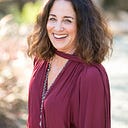Louise Glück, who died a few weeks ago at the age of 80, was a celebrated American poet whose work explored universal human themes such as love, nature, trauma, family conflict, motherhood, marriage, intimacy, memory, loss, and death.
In 2020, Glück received the Nobel Prize in Literature. She wrote powerful, lyrical poetry that deeply touched all her readers. Glück was a graduate of the esteemed Sarah Lawrence College and of Columbia University’s School of General Studies.
While we were only eleven years apart, we grew up in the same part of the country, Long Island, New York, where there was a heavy concentration of Jewish families. Many of us were born Jewish and understood our heritage — for example, my father was a Holocaust survivor — but we didn’t practice the traditional rituals of our ancestors; we honored them instead. Glück described her Jewish upbringing as “rudimentary,” and saw her connection with Judaism, like many of us, as ambivalent.
In a 2014 article in The New York Times, poet Peter Campion wrote about Glück, “Few living poets have dwelt as successfully on the past. Often employing the idioms of depth psychology — the analytic koans, the mythic analogies — she tends to approach her narratives of familial and erotic love from the side of their endings, with more than a touch of fatalism.” Her poetry was largely…
